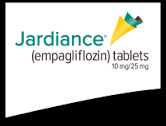- Home
- Editorial
- News
- Practice Guidelines
- Anesthesiology Guidelines
- Cancer Guidelines
- Cardiac Sciences Guidelines
- Critical Care Guidelines
- Dentistry Guidelines
- Dermatology Guidelines
- Diabetes and Endo Guidelines
- Diagnostics Guidelines
- ENT Guidelines
- Featured Practice Guidelines
- Gastroenterology Guidelines
- Geriatrics Guidelines
- Medicine Guidelines
- Nephrology Guidelines
- Neurosciences Guidelines
- Obs and Gynae Guidelines
- Ophthalmology Guidelines
- Orthopaedics Guidelines
- Paediatrics Guidelines
- Psychiatry Guidelines
- Pulmonology Guidelines
- Radiology Guidelines
- Surgery Guidelines
- Urology Guidelines
Empagliflozin reduces adverse cardiovascular events in type 2 diabetes patients

Empagliflozin is a drug of gliflozin class, approved for the treatment of type 2 diabetes in adults in 2014. Empagliflozin is an inhibitor of the sodium glucose co-transporter-2 (SGLT-2), and causes sugar in the blood to be excreted by the kidneys and eliminated in urine.Date Published: 06 May 2016.
In the EMPA-REG OUTCOME trial, empagliflozin (10 mg or 25 mg) added to standard of care reduced the risk of 3-point major adverse cardiovascular events (cardiovascular death, nonfatal myocardial infarction, nonfatal stroke), cardiovascular and all-cause death, and hospitalization for heart failure in 7020 patients with type 2 diabetes and high cardiovascular risk compared to placebo.
Researches investigated heart failure outcomes in all EMPA-REG OUTCOME patients and in subgroups, including the 10.1% of patients with HF at baseline. Mean duration of treatment was 2.6 years, and median follow-up time was 3.1 years.
The combined endpoint of heart failure hospitalization or cardiovascular death occurred in 5.7% of empagliflozin-treated patients compared to 8.5% of placebo-treated with a consistent effect seen with both doses and across different subgroups defined by baseline characteristics, including in those with and without baseline heart failure.
In those with heart failure at baseline, the incidence rates for all outcomes (e.g. hospitalization for heart failure, CV death, all-cause death) were two- to six-fold higher than for those without heart failure at baseline. However, the reductions in the risk of these outcomes with empagliflozin were consistent in both groups.
Serious adverse events and adverse events leading to study drug discontinuation were more common in patients with versus without heart failure at baseline in both treatment groups, but no excess risk was noted with empagliflozin compared to placebo.
The investigators concluded that in patients with type 2 diabetes and high cardiovascular risk, empagliflozin significantly reduced heart failure hospitalization and cardiovascular death compared to placebo, with a consistent benefit seen across various subgroups, including in patients with and without heart failure at baseline. “The effect of empagliflozin on heart failure hospitalization and cardiovascular death and on all-cause hospitalization was observed very early and was sustained throughout the trial,” wrote the authors.
Reference
http://www.ncbi.nlm.nih.gov/pubmed/26378978
Dr Prem Aggarwal, (MD, DNB Medicine, DNB Cardiology) is a Cardiologist by profession and also the Co-founder of Medical Dialogues. He is the Chairman of Sanjeevan Hospital in Central Delhi and also serving as the member of Delhi Medical Council

Disclaimer: This site is primarily intended for healthcare professionals. Any content/information on this website does not replace the advice of medical and/or health professionals and should not be construed as medical/diagnostic advice/endorsement or prescription. Use of this site is subject to our terms of use, privacy policy, advertisement policy. © 2020 Minerva Medical Treatment Pvt Ltd